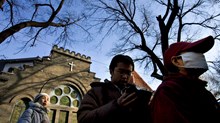I'm in Cape Town for the third Lausanne Congress on World Evangelization. Four thousand delegates are here in what is being described as the most representative gathering of Christian leaders in history. But one group is notably underrepresented: prominent figures associated with evangelical Christianity in the United States, especially pastors of large churches. Rather than name names, let me put it this way: pick a celebrated American evangelical church leader, especially one who founded his current congregation, and I will give you 5-1 odds that he (and most of the missing are "he"s) is not here, at least not as part of the official US delegation.
For better and for worse, these absences tell us a lot about power, influence, innovation, and the future of global movements like evangelical Christianity. Here are a few lessons from the ecclesial Realpolitik of the no-shows (in rough order from brutally honest to genuinely hopeful) . . . .
For megapastors, platform time is the price of participation. Entrepreneurial pastors live to speak. Or perhaps more accurately and fairly, they live to influence, and they exercise much of their public influence by speaking. If they are not given a speaking slot, they are likely to conclude that their time can be better spent elsewhere.
Several speakers at Cape Town 2010 have commented on the weighty responsibility of addressing 4,000 of their fellow leaders. But the pastors who aren't here address audiences that size or larger every week, and the audiences they address are much more willing to follow their lead than a heterogenous group of international representatives. Two prominent American pastors who are here, John Piper and Tim Keller, both were given significant speaking responsibilities. Of course there are very busy leaders, like Wooddale Church's Leith Anderson and Evergreen Baptist Church's Ken Fong, who are happy to participate around the tables in the main hall with no special recognition—but they are notable exceptions.
Learning happens in the hallways, not the hall. Sitting in a conference hall hearing presentations is a highly inefficient use of time. You can easily read the text of a twenty-minute talk in five minutes—twice. (Video is even more inefficient—you can read the script of a ten-minute video in under a minute.)
By contrast, conversations in the hallways can be brief, responsive to a busy leader's interests, and easily cut short if a more important or interesting person walks by. And the hallways have a serendipity factor that suits the curiosity and short attention spans of entrepreneurs—you never know who you'll run into. As masterful stagers of events themselves, megapastors know all too well that what happens in the hall is highly choreographed and designed to minimize surprise (at least to the event organizers). They would much rather take their chances in the hallways.
Innovation happens today in small distributed networks, not in large centralized meetings.Much of the most creative and innovative work being done in mission—both practice and theology—is happening in ad hoc networks made easier by inexpensive air travel and widespread Internet access. Megapastors and their churches have already sought out the most innovative and forward-thinking leaders in the world, and keep up ties with them through regular visits and nearly continuous virtual communication.
Meanwhile, a large event like Cape Town 2010 has to hew to the center of the bell curve—otherwise it would alienate or confuse crucial constituencies. Small networks are much more able to generate and disseminate genuinely novel ideas and practices, and one of the paradoxical geniuses of the megapastors is their ability to stay connected with small innovative networks even as they oversee large organizations.
The globalization that made "Lausanne 1974" so powerful, and made "Lausanne 2010" possible, may well make "Lausanne 2046" unnecessary. For many of the participants in the 1974 meeting, it was a once-in-a-lifetime opportunity to connect with leaders from other parts of the (largely Western) Christian world. Yet the 1974 meeting occurred on the cusp of revolutionary declines in the cost of international travel and communication, which provided its leaders and its message with a powerful cultural tailwind that dramatically increased their influence. Today most of the leaders at Cape Town 2010 live lives saturated by connectivity, which makes such singular meetings less significant.
Assuming we avoid global cataclysms as well in the next 36 years as we have in the last 36, it seems to me a safe bet that global evangelicalism will be even more networked and interconnected when I am the age of René Padilla and Samuel Escobar (the young guns of Lausanne 1974, who took the stage last night to warm and reverent applause) than it is today. Undoubtedly there will continue to be all sorts of occasions large and small for global leaders to meet and learn from one another in 2046. But the very multiplication of those opportunities will make singular events like Cape Town 2010 less likely to be seen as justifying the massive effort and expense they require.
The absence of major American figures really doesn't matter and probably actually helps—for two reasons. First, they are already so well connected that anything of import that happens at Cape Town 2010 will reach and influence them. Second, and more important, their absence has created space for others. There are young leaders, women leaders, and leaders from minority cultures in the USA who took (at least metaphorically) the chairs vacated by the busy megapastors, and unlike the megapastors they do benefit tremendously from the new connections and learning opportunities in Cape Town. They also have room to speak and lead that they might not have otherwise. And some of them will stay in touch and collaborate for years after Cape Town 2010 is over. Very likely, when we look back from 2046, we will discover that the most significant outcomes of Cape Town 2010, unforeseen and unforeseeable today, came from those relationships—and from the very spaces created by the missing megapastors. And in 2046, without a doubt, those leaders will be the ones having to make the tough decisions about what to do with their power and their all-too-limited time—just like the no-shows of 2010.

Support Our Work
Subscribe to CT for less than $4.25/month

















